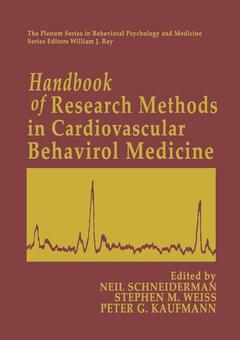Description
Handbook of Research Methods in Cardiovascular Behavioral Medicine, Softcover reprint of the original 1st ed. 1989
The Springer Series in Behavioral Psychophysiology and Medicine Series
Coordinators: Schneiderman Neil, Weiss Stephen M., Kaufmann Peter G.
Language: English
Subjects for Handbook of Research Methods in Cardiovascular...:
Publication date: 06-2013
717 p. · 21x29.7 cm · Paperback
717 p. · 21x29.7 cm · Paperback
Description
/li>Contents
/li>
Behavioral medicine requires understanding of the interactive as well as the independent contributions to disease process made by behavioral/psychological factors, analysis of the mechanisms of association between behavior and disease state (and development of intervention and prevention strategies)
I. Cardiovascular Measurement in the Laboratory.- 1 Structure and Function of the Cardiovascular System.- 2 Noninvasive Measurement of Cardiac Functions.- 3 The Experimental Study of Behaviorally Induced Arrhythmias.- 4 The Measurement of Blood Pressure.- 5 Measurement of Blood Flow and Venous Distensibility.- 6 Autonomic Function Testing.- 7 Microneurographic Measurement of Sympathetic Nerve Activity in Humans.- 8 Measurement of Volume Regulation: Renal Function.- II. Measurement Issues in Physiology-Biochemistry.- 9 Electrolytes.- 10 Methods for Study of Carbohydrate Metabolism.- 11 Catecholamine Measurement in Behavioral Research.- 12 Adrenocortical and Gonadal Steroids in Behavioral Cardiovascular Medicine.- 13 Measurement and Function of Neuropeptides: Focus on Corticotropin-Releasing Factor and Arginine Vasopressin.- 14 Receptors.- 15 The Renin—Angiotensin—Aldosterone System and Atrial Natriuretic Factor.- III. Ambulatory Monitoring.- 16 Ambulatory Monitoring: Applications and Limitations.- 17 Ambulatory Electrocardiographic Monitoring: Methods and Applications.- 18 Research Techniques for Ambulatory Blood Pressure Monitoring.- 19 Methods for Ambulatory Monitoring of Blood and Urine.- 20 Diaries in Ambulatory Monitoring.- 21 Data Analysis of Ambulatory Blood Pressure Readings: Before p Values.- IV. Laboratory Tasks, Procedures, and Nonpsychometric Subject Variables.- 22 Psychophysiologic Strategies in Laboratory Research.- 23 Psychophysiologic Reactivity as a Dimension of Individual Differences.- 24 The Social Context of Stress and Behavioral Medicine Research: Instructions, Experimenter Effects, and Social Interactions.- 25 Physical Stressors and Pharmacologic Manipulations: Neurohumoral and Hemodynamic Responses in Hypertension.- 26 Hemodynamic Assessmentand Pharmacologic Probes as Tools to Analyze Cardiovascular Reactivity.- 27 Constitutional Factors Relating to Differences in Cardiovascular Response.- 28 Ethnic Differences in Resting and Stress-Induced Cardiovascular and Humoral Activity: An Overview.- 29 Cardiovascular and Neuroendocrine Responses to Challenge in Males and Females.- V. Psychometric Assessment.- 30 An Overview of Issues in Psychometric Assessment.- 31 Personality Dimensions in Reactivity and Cardiovascular Disease.- 32 Stress and Social Support: Assessment Issues.- 33 Assessing Subjects’ Construal of the Laboratory Situation.- 34 Observational Methods for Assessing Psychological State.- 35 Definition and Assessment of Coronary-Prone Behavior.- VI. Research Designs and Statistical Concerns.- 36 Research Designs in Behavioral Cardiovascular Research.- 37 The Analysis of Continuous Data.- 38 Power Calculations for Statistical Design.- 39 Experimental Studies in the Field: Some Pragmatic Considerations.- 40 Metaanalysis of Related Research.- 41 Pooling of Data from Independent Studies.- 42 Clinical Trials.
© 2024 LAVOISIER S.A.S.




